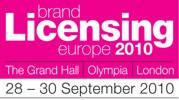| ||
| 28 September 2010, London - Day one of Brand Licensing Europe 2010 kicked off in style with the keynote speech from Andrew Davenport, the award-winning creator, writer and composer of the children’s television phenomenon, In The Night Garden, and co-creator and writer of the global smash television hit, Teletubbies. Here are the key points he made in his fascinating speech earlier today:
For more information on Brand Licensing Europe, go to www.brandlicensing.eu. |
